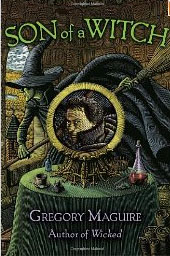 A caravan traveling through an isolated part of the Land of Oz comes across a corpse. This isn’t the first they’ve seen on their journey, but the others have been “scraped,” the faces of the dead removed with surgical precision.
A caravan traveling through an isolated part of the Land of Oz comes across a corpse. This isn’t the first they’ve seen on their journey, but the others have been “scraped,” the faces of the dead removed with surgical precision.
Except this body isn’t dead. Yet. Though badly beaten, Liir Thropp, a young man who may or may not be the son of the infamous Elphaba Thropp, Wicked Witch of the West, is still alive. The caravan delivers him to a convent where he is coaxed back to health by a mute young woman name Candle.
His recovery, seen through the eyes of Candle and the maunts (nuns) of the convent, is juxtaposed with the story of how he came to be found, broken and near dead. That narrative picks up right where Wicked ended, with the watery death of the Witch.
For lack of anything else to do, Liir (then in his mid-teens), agrees to accompany Dorothy and company back to the Emerald City where she will collect her reward from the Wizard. Dorothy’s meeting with the Wizard ends the Wizard’s reign over Oz. He is succeeded, briefly by the Scarecrow, Glinda, and finally the Emperor. And if the Animals (talking animals) and minority populations (Munchkins, Yunamata, Scrow, etc.) thought things were bad under the Wizard, well, they are worse under the Emperor.
But the Emperor’s predations on Oz’s populace aren’t Liir’s concern. Liir, at the beginning of the novel, is practically a blank slate. Anyone expecting a protagonist with Elphaba’s strength of character will be disappointed. Son of a Witch is sort of a “coming of age/journey of self-discovery” kind of story.
Liir begins the story with a vague goal–to find Nor, the girl who may be his half-sister. His attempt to save her from Southsides, the Emerald City’s vast dungeon, is pre-empted by her apparent successful escape attempt. Unsure what to do next, he joins the City Guard, where he spends an aimless decade. Eventually, he is drawn into the nascent rebellion against the Emperor, taking on a more Elphaba-like role. (It’s must suck to be an emperor, what with people always rebelling.)
This is the third Gregory Maguire novel I’ve read (Wicked and Lost, being the others). And so far, I’d say that Maguire has a penchant for prickly, difficult characters. In his worlds, genuine affection and friendship seems in short supply, and no one ever has a pleasant conversation, with all dialogue being sort of snippy and underlain with uncomfortable tension.
I was never particularly fond of Elphaba, though I found her compelling and one of the most unique protagonists I’ve ever read. Liir, though possessing Elphaba’s argumentative nature and a tendency, as Glinda says, to “refuse to be consoled,” is a bit more approachable, softer even. But the wandering pace and Liir’s initially aimlessness makes for a sometimes ponderous read. It takes a terribly long time for the story (and Liir) to get back to the initial mystery–the murdered and scaped novice maunts.
Nevertheless, it was fun to revisit Oz again. I give it a C for effort.


